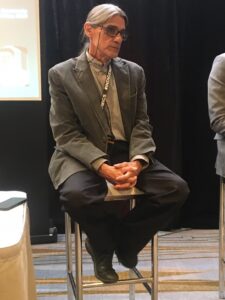Dokis First Nation member provides insights on A.I. at Toronto conference

By Sam Laskaris
TORONTO – When it comes to artificial intelligence (A.I.), Doug Dokis has some mixed thoughts.
Dokis, who is a member of Dokis First Nation in Northern Ontario, spoke on the pros and cons of A.I. at the Indigenomics Bay Street conference, which wrapped up on Nov. 23 in Toronto. Dokis was one of the panellists on a session titled Expanding Opportunity Through Skills For A Digital Economy.
“As far as A.I. is concerned, it’s an amazing tool,” said Dokis, who is an advisor for Acuta. “But I also see it as a great threat. And I think we need to talk about ethical relationships. We need to talk about ethical use. And we need to teach it. Far too often, everything is moving so quickly that we don’t have time to talk about, really talk about and explore.”
Acuta is a national non-profit organization that does STEM (Science, Technology, Engineering, and Math) outreach across Canada, reaching about 400,000 children per year. Of those, about 35,000 are Indigenous youth.
Dokis is now an advisor for Acuta. He previously served as a director, working with about 200 communities to develop programming from Grade 3 through post-secondary levels.
“We really need to emphasize the importance of having conversations about A.I., its applications, how it can contribute to humanity, and where we’re going,” Dokis added. “And also, we need to have honest conversations about the dangers.”
The Indigenomics Bay Street conference included Indigenous leaders from the private and corporate sectors sharing their thoughts on various topics dealing with the Indigenous economy. Several government officials also spoke at the conference.
The Expanding Opportunity Through Skills For A Digital Economy session centred on how to build partnerships with communities, non-profits, and those in the industry and public sectors to
ensure people have the skills to succeed in a digital economy.
Dokis said there are different approaches to getting people excited and engaged with digital things.
“I think of it from early, often, relevant, and fun,” he said. “Like so many things digital, technology and all the emerging technologies coming into play now, like any sector, there’s only a certain portion of the population that really wants it.”
While others lambast younger generations playing video games, Dokis doesn’t believe it is necessarily a bad thing.
“Most of you recognize that our kids are playing on video games, so they are engaged,” he said. “They love it. And it’s fun, but is it teaching them the skills that they need to enter into the workforce or to build careers in that area.”
Dokis believes the sooner younger generations learn about technology, the better off they’ll be.
“It has to be introduced to them early,” he said. “We live in a very compartmentalized society today. So that’s the early piece. We have to teach young people early what is this technology, what does it do and how does it work, what is coding, what are the different mechanisms behind the technology itself, along the way making it fun on an early basis.”
Dokis added the relevance of technology also needs to be a focus.
“There is no relevance to computer games as to what is happening say in First Nations communities,” he said. “So, what we do at Actua is we build content that is relevant to caribou migrations or harvesting practices, water sustainability, land management.”
Dokis said the same thinking applies to the mainstream education system.
“Young people don’t see the relevance of digital technology,” he said. “It’s part of the curriculum. My kids love gym and art. So, these other program areas are not relevant to their day-to-day lives. So, the education system itself has to change in a way that it can adapt to the relevance of young people that are coming into the system. And that includes how we introduce technology to them.”

